Raima Larter's Blog, page 3
December 21, 2023
Annual Writing Report
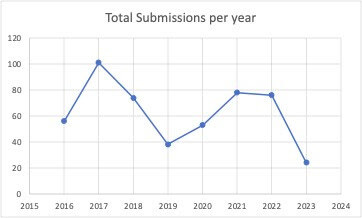
For months, I've been feeling as if my writing was not going well, either in terms of submitting things or even spending time doing it. It was both a vague feeling, as well as a fact based in evidence. I'm the sort of person who keeps track of things, and I could look at data such as pieces submitted, hours spent on writing, etc, and see that things were bad.
The first thing I noticed was that I just haven't submitted very much this year. I have finished a few pieces and sent them out, but only 24 times so far in 2023. This is much lower than my submission rates in recent years, as shown in the above graph. The lowest number of submissions in recent years is for 2019, when I was battling breast cancer. There's at least an explanation for that! This year is lower than even 2019, so I needed to dig a little deeper to understand what's going on.
In addition to keeping track of submissions, I also log my writing time. Despite having totaled these hours up each week, I really didn't have a good sense about how much I was writing, since I never looked at monthly or yearly totals, much less at any trends.
So, last week, I started adding up entries in my little writing log book. When I saw that I'd written for a grand total of three and a half hours in the entire month of April and only 45 minutes (total!) in September, I knew this was going to be a bad year. I kept on tallying things, calculating the total hours spent writing for each month, then averaging over the months of the year. I did this all the way back to 2017, the year after I received my MFA, and was shocked to see the result:
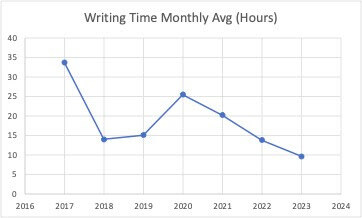
That first year is probably an anomaly, since I had so much work in the pipeline from my master's program and the writing just poured out. The next year is low, but I don't trust that number since I apparently did not keep track of any writing for most of the year. 2019 is, again, the year I was battling illness, but then things get back on track.
Until they don't. There is a clear and obvious decline, year by year, in the amount of time I spend actually writing. If one were to lay a ruler on the above graph for the last four years and ask where this is headed, it looks like one would predict that Raima will stop writing completely in two years time.
And I don't want that. Not by a long shot! So, something needs to change. I've already set a rule for myself that I will write for at least 15 minutes every morning Monday - Friday, and so far I've had a pretty good initial week. This is a slightly early new year's resolution, and my plan is to continue doing this into the new year.
Last year at about this time I announced that I was starting a new position as Assistant Fiction Editor for Utopia Science Fiction Magazine. I have done that for over a year now, and was elevated to Nonfiction Editor several months ago. We are still going strong, and it's been a real pleasure to work with the other editors and staff of this great scifi publication. Although it's been a lot of work, I can't really blame my lack of productivity (summarized above) on this volunteer position, since I've been reading for literary journals of one sort or another for several years. This type of work has been, and continues to be, a real joy and I have no intention of giving it up.
In addition to the distressing data shown above, I had a some good news in my writing life this year. My flash fiction piece, Maude's Place, was published by Flash Fiction Magazine back in January. This was the only new piece I had published this year, but Big Blue Marble was reprinted as part of the 5th year anniversary anthology for Utopia Science Fiction. Perhaps with some of the new year's resolutions noted above, I can improve on these statistics next year. I'll keep on keeping track and will report back in a year.
Wishing everyone the best in the coming year!
Thanks for reading Complexity Simplified! Subscribe for free to receive new posts and support my work.
December 11, 2023
Fifteen Years
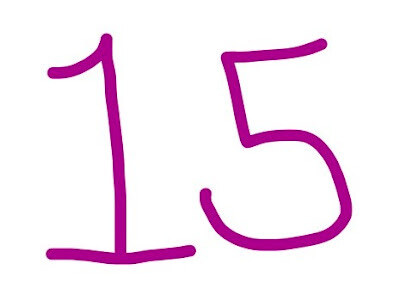
Note: the following was posted earlier today on my long-running blog, raimalarter.com. Thanks for subscribing to the Substack feed.
Today marks the fifteenth anniversary of my blog! I never expected when I started this blog way back in 2008 that it would still be going strong 15 years later. But here we are.
I've had some ups and downs in publishing frequency, and have sometimes not posted for several months at a time, but have never missed an entire year - although 2015 looks a little bleak, with only 4 posts, all published in December of that year. Since I was in the midst of an MFA program at the time, it's probably understandable that I didn't have a lot of time to blog that year. And although I've been determined to do better in 2023, I've sometimes only been able to write and publish once a month. As usual, I vow to do better next year!
I remember the night when I decided to try my hand at blogging. I was working on an early draft of a book, Spiritual Insights from the New Science, which was eventually published many years later. I wanted to try out a few ideas for this book with short blog posts, but didn't know how to get those posts in front of interested readers.
And then I learned about Twitter. This was in 2008, so a very different social media era than we are in now--and to be honest, I didn't really understand why someone would want to use something like Twitter. However, when I learned that it was possible to post links as part of a tweet, I saw at least one use for it. I could write a longer post about a topic I was interested in, post a link to it on a tweet, and try to connect with people who might have an interest in that topic.
It actually worked - until Twitter started to change and became something called X and is now a place I never want to use again. In those early days, I found thousands of people who were interested in the things I was interested in, and Twitter (and, eventually, FaceBook as well) became the portals through which I could bring people to my blog and, in turn, to information about other things I might be publishing (like stories and books).
The social media landscape is in a state of flux, though, and I've found ways to get the word out about my blog posts and to connect with readers. We will see if I'm still writing blog posts in another 15 years. I hope so!
Thanks for reading Complexity Simplified! Subscribe for free to receive new posts and support my work.
November 30, 2023
Another One Bites the Dust?
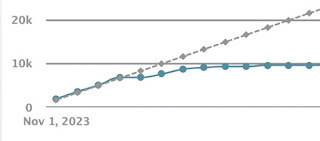
Although the month started off with great plans for writing a full 50,000 words to finish a draft of the novel I started during last year's NaNoWriMo challenge, you can see from this word count graph what happened: I made it to 10,000 words and stalled.
The problem, in hindsight, was that I didn't know what the ending of the novel was going to be, so I spent a lot of time brainstorming after the first couple of weeks. This did not result in an increased word count, but it did increase my sense of clarity about this book and where it's going. And I started writing again yesterday...two days before the month ends!
So, consider this the beginning of December's personal writing challenge: to finish a draft of this novel before the new year. I suppose I could consider this year's NaNoWriMo a failure, but I don't. I have a lot more words than I had in October, as well as a much better idea of the story I'm trying to tell.
On to December!
Thanks for reading Complexity Simplified! Subscribe for free to receive new posts and support my work.
October 25, 2023
Almost November
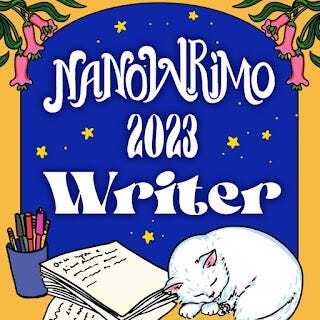
Only one week to go before November arrives, and with it the annual NaNoWriMo event, which I plan to take part in again. This will be my thirteenth time participating and I sure hope that doesn't mean it will be an unlucky attempt.
I fully intend to write 50,000 words next month, and I even have an idea of what I'm going to write! This is not always the case, although sometimes it is. I've started several novels using the NaNoWriMo event to get a bunch of words on paper that I can revise and edit. And I've even published one of those!
Fearless, my first novel, started as a NaNoWriMo project. Actually two projects, since I wrote the first half one year, and the second half a couple of years later.
This year's project is also the second half of a novel that I started in a previous NaNoWriMo year - my first year, in fact. So, it's been jostling around in my brain for quite awhile, and I think it's time to finish this thing.
Thanks for reading Complexity Simplified! Subscribe for free to receive new posts and support my work.
August 28, 2023
How to Support Indie Bookstores
As so many have pointed out, Amazon has been a devastating force in the bookshop world, and many local and independent bookstores have gone out of business as a result. Some have managed to survive, however, and many of us try to buy books through our local bookshops as often as we can to keep our favorite haunts alive.
I have been a huge fan of the organization Bookshop.org ever since they first began operating. This website allows buyers to order books online, as easily as one can do through Amazon, but with an important difference: buyers are allowed to choose their local bookstore to share part of the proceeds with. Even if you don't choose a particular bookstore, the Bookshop folks will still share part of the proceeds with independent bookstores everywhere.
I have tried to encourage readers of my books to order them through the Bookshop website. The organization is now making it even easier to do that through its Affiliates program that brings Independent Authors into the fold. I've applied for and been approved as a Bookshop Affiliate, and am happy to announce that I have a small "online bookstore" through the Bookshop.org website. You can find my little shop here.
Each of my books have been published in different ways: one with a traditional publisher, one with an independent small press, another with a hybrid publisher, and even a couple that are self-published. Despite this variety of publishing models, Bookshop.org carries all my books.
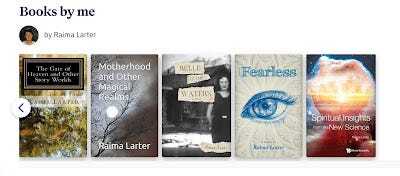
In addition to listing my own books, I also have a list of books I've read and recommend. Some of these are by my writing friends and colleagues, whereas others are just books I've read and really liked. You can think of this as the "recommended by staff" tags you might see at your local bricks-and-mortar shop. I fully expect this part of my little shop to grow, since I don't seem to be able to stop reading books.
Finally, I've updated all the links to my own books on my website so they default to the Bookshop.org website, rather than to Amazon. The Amazon links are still there, since I understand some people prefer to buy books that way...but the Amazon listing is now secondary.
If you are an author with books to sell, I encourage you to look at what Bookshop.org can do for authors. They've posted more info here. Happy reading!
Thanks for reading Complexity Simplified! Subscribe for free to receive new posts and support my work.
July 27, 2023
Where to Submit Your Stuff

I have not been submitting my short stories this year, and I really need to rectify that. I have been writing some things, but they sit on my desk rather than on some editor's desk, and that's not going to get them to any readers.
I may not be alone in this, but I've heard from other writers (particularly those new to the process) that they don't know how to find places to submit their work to. This is not my problem, since I know of lots of places to look for possible submission opportunities--and I thought, maybe, I should share these.
This, of course, means, I'm spending my time writing a blog post instead of submitting...! But, writing some words of some kind is probably good. So, here goes.
First up: Duotrope is a great resource and very helpful for both searching for new places to submit as well as keeping track of your own submissions. There is a fee for this service (about $50 a year) which is a better use of your funds, in my opinion, than paying for a contest. They do have a free trial period, though, so you don't need to commit until you're sure you like it.
A free option that is similar, but newer, is Chill Subs. They have a database of 3000+ literary magazines which you can search using a variety of filters. I have not used this yet, since they were very new when I first heard about them, but other writers seem to like them a lot.
There is also a "Discovery" option in Submittable, which lists deadlines, opening and closing of submissions, and the like. All writers should get an account on Submittable anyway (it's free) since many journals require submissions be made through their portal.
Another searchable database that is devoted exclusively to speculative fiction is the Submission Grinder. This is run and managed by the litmag Diabolical Plots, so check that out as well.
I can also recommend two ranked listings of markets that are more focused on literary fiction, although neither is restricted to that. These two are maintained by fellow writers who have each developed a ranking method that is unique to them.
First is Cliff Garstang's list; he ranks markets for fiction, poetry and nonfiction by the number of Pushcart prizes awarded to that journal. I have used Cliff's list many times, and it was especially helpful when I was a new writer and didn't know a thing about which journals were more respected than others. Many of us are very grateful to Cliff for maintaining this list for years now!
Another option is a ranked list maintained by Erika Krouse, who divides her list into tiers. She labels the top tier Career Making (this includes the New Yorker, the Atlantic, and Harper's). This somewhat impossible tier is followed by nearly 500 other magazines divided into these tiers: Elite, Highly Respected, Respected, and Very Good, and another listing for respected genre magazines (such as science fiction, fantasy, and mystery). Like Cliff's list, Erika uses prizes to rank journals, but includes the O. Henry awards and Best American Short stories. She also includes factors such as circulation, payment for writers, and generally good citizenship in the lit world.
I hope this gives you some ideas about where to start. Now go send something out! The truth is that your chances of getting published are ZERO if you never submit. And, yes, I'm talking to myself here!
April 27, 2023
Coming Soon!

We have been hard at work on our next issue of Utopia Science Fiction Magazine and I have a sneak preview of the cover for you (see above!) and a list of this month's contributors, including J.S. Johnson, Nadine Aurora Tabing, Ray Daley, and others.
We are very excited by this issue, which focuses on "Retro SciFi" -- classic science fiction, but without the racism, sexism, or colonialism. This issue will publish soon, on April 30!
You can subscribe here or check the website anytime after the issue is published to buy a single print or digital copy.
If you are interested in writing for us, submission guidelines are here. We are looking for fiction and poetry, but are also very much interested in short nonfiction pieces about cool science. We're open to queries about the latter if you have something in mind. You can contact us through the form at the bottom of this page or submit a finished piece using the link to submission guidelines above.
Thanks for reading Complexity Simplified! Subscribe for free to receive new posts and support my work.
February 25, 2023
The Importance of Fiction
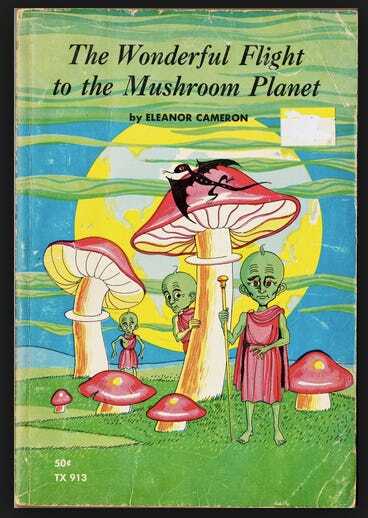
When I was about ten years old, my mother gave me a book to read that she said was about "a little girl who reminds me of you." The book was Madeleine L'Engle's A Wrinkle in Time and it was one of the first science fiction books I'd ever read.
Mama was right--that little girl I was became a scientist (eventually) and I've always thought that L'Engle's book, as well as classics such as The Wonderful Flight to the Mushroom Planet by Eleanor Cameron, helped me find my way into science as a profession.
Fast forward several decades, and I am now an Assistant Fiction Editor at Utopia Science Fiction Magazine. We publish optimistic stories of a future we might want to live in one day. It is my hope that our stories will inspire kids to consider science as a career, much as the science fiction I read so many years ago inspired me.
We have been running a Kickstarter Campaign during the month of February to raise enough money to publish another year of stories. If we surpass our goal of $5000 we can raise pay rates for writers and might even be able to publish an anthology.
Please consider helping out. The campaign ends on Tuesday (two days from now!) and we need only a few hundred dollars to reach our goal. If the goal isn't reached, we won't receive any of the funds pledged so far, so your help now can truly make this project successful.
Here's the link to donate. Thanks so much for your support!
Thank you for reading Complexity Simplified. This post is public so feel free to share it.
February 8, 2023
Nearly Wordless Wednesday

For more Wordless Wednesday, see the main site.
For more of my photos, see Flickr.
Follow me on Mastodon!
Thank you for reading Complexity Simplified. This post is public so feel free to share it.
January 30, 2023
What's in a Name?

Years ago, when I first started this blog, my goal was to explore ways in which the study of complex systems might inform our understanding of life. That, in a nutshell, is the origin of my blog’s name, Complexity Simplified. However, new readers may not have seen my early posts, so I thought it useful to review some of the concepts I explored years ago when the blog was new.
I’ll start with some definitions: the science of complexity is the study of complex adaptive systems. This type of science is concerned with understanding how complex systems evolve and change, especially when they self-organize and new behaviors and properties emerge. To delve into this type of science, we first need to define what is meant by a complex system.
Complex systems are “smart.” This means that they adapt when conditions change, rather than merely reacting to those changes. A thermometer is not a complex system, since an increase in temperature merely causes liquid to rise up the thermometer’s glass tube a certain distance in proportion to that temperature change. The thermometer simply reacts to the change. It is not smart enough to adapt to the changing temperature.
Our bodies, of course, are smart enough to adapt—within limits. Other complex systems can do this as well. Consider, for example, an ecological system. This collection of plants, animals, microbes, bodies of water, wetlands, deserts, and so on is a system in which the parts are connected and interdependent. An ecological system can adapt to temperature changes. It is smarter than a thermometer.
Every time the season changes, as temperatures plummet at the approach of winter or soar when summer arrives, an eco-system adapts and survives. Even if those changes become long-term or even permanent, an ecological system has ways to adapt. Eco-systems are smart because they can adjust to a change in climate by, for example, shifting the mix of species. In this way, the system as a whole survives. The end result of this adaptation could be a very different eco-system than the original, though. Individual animals or plants, or even entire species within that system may not make it, but the system as a whole will likely survive. It has adapted.
This is not to say that climate change is “okay.” In order for an eco-system to adjust to something as severe as the warming of the entire planet, it is highly likely that some species will go extinct. One of those species could be our own.
Our immune system is another example of a smart, complex system. It will adapt by ramping up to an activated state when a virus or bacterium enters our body. All systems in the body are adaptable and, thus, complex. Social systems are also considered to be complex systems, since they have the ability to adapt to changing conditions. In fact, social systems, in many ways, act more like a living organism than like a machine. All of these complex systems have one characteristic in common: they are capable of adapting to change, sometimes in creative and unexpected ways.
***
This post is an excerpt from the Introduction to my book Spiritual Insights from the New Science: Complex Systems and Life. I hope to provide additional excerpts in future blog posts. Get your copy anywhere books or sold, or directly from the publisher, World Scientific Publishing.
Thank you for reading Complexity Simplified. This post is public so feel free to share it.



